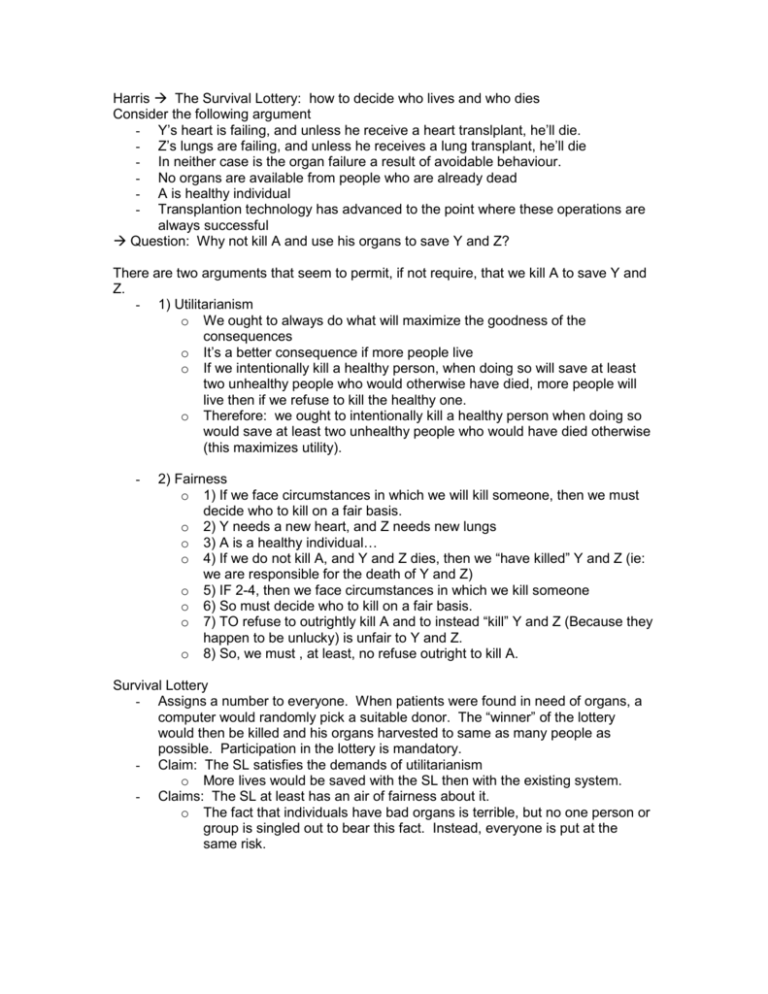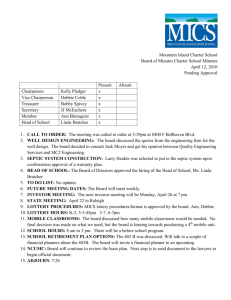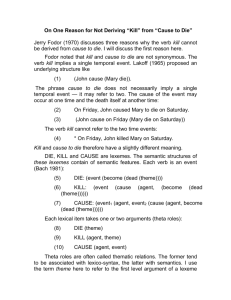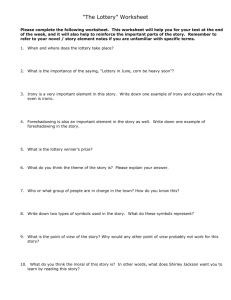Harris → The Survival Lottery: how to decide who lives
advertisement

Harris The Survival Lottery: how to decide who lives and who dies Consider the following argument - Y’s heart is failing, and unless he receive a heart translplant, he’ll die. - Z’s lungs are failing, and unless he receives a lung transplant, he’ll die - In neither case is the organ failure a result of avoidable behaviour. - No organs are available from people who are already dead - A is healthy individual - Transplantion technology has advanced to the point where these operations are always successful Question: Why not kill A and use his organs to save Y and Z? There are two arguments that seem to permit, if not require, that we kill A to save Y and Z. - 1) Utilitarianism o We ought to always do what will maximize the goodness of the consequences o It’s a better consequence if more people live o If we intentionally kill a healthy person, when doing so will save at least two unhealthy people who would otherwise have died, more people will live then if we refuse to kill the healthy one. o Therefore: we ought to intentionally kill a healthy person when doing so would save at least two unhealthy people who would have died otherwise (this maximizes utility). - 2) Fairness o 1) If we face circumstances in which we will kill someone, then we must decide who to kill on a fair basis. o 2) Y needs a new heart, and Z needs new lungs o 3) A is a healthy individual… o 4) If we do not kill A, and Y and Z dies, then we “have killed” Y and Z (ie: we are responsible for the death of Y and Z) o 5) IF 2-4, then we face circumstances in which we kill someone o 6) So must decide who to kill on a fair basis. o 7) TO refuse to outrightly kill A and to instead “kill” Y and Z (Because they happen to be unlucky) is unfair to Y and Z. o 8) So, we must , at least, no refuse outright to kill A. Survival Lottery - Assigns a number to everyone. When patients were found in need of organs, a computer would randomly pick a suitable donor. The “winner” of the lottery would then be killed and his organs harvested to same as many people as possible. Participation in the lottery is mandatory. - Claim: The SL satisfies the demands of utilitarianism o More lives would be saved with the SL then with the existing system. - Claims: The SL at least has an air of fairness about it. o The fact that individuals have bad organs is terrible, but no one person or group is singled out to bear this fact. Instead, everyone is put at the same risk. Six Objections to the Lottery (and responses) - 1) It reduces our security. o Response: Except that it doesn't, and people need better education in what does and doesn't make them secure. - 2) We should not "play God." o Response: The same objection would make us stop doing transplants altogether. - 3) Killing is worse than letting die, so it's better to let Y and Z die. o Response: But other cases of inaction are a type of killing, so why isn't a refusal to use the lottery a sort of killing? - 4) It makes too high a demand on us. We don't have to be "saints" and give up our lives when we want to live. Ie: the right to self-defense. o Response: Yes, and by saying that Y and Z have a right to kill in selfdefense, we can agree to the lottery, provided anyone they would kill has a equal right to kill Y and Z in similar circumstances. - 5) The lottery will create too much terror and distress. o Response: Yes, in the short run, but time (and education) will get people used to it. - 6) Third parties cannot decide who to save and who to kill, so only those who "are going to die" soon should be put into the lottery. o Response: This objection already assumes that people who are very ill have lives that are of less value than everyone else's. Besides, if there IS a lottery, they are not really "going to die," at least not any more than any other living person.








